Irpin
Kyiv region, Ukraine
Rapid Assessment of Recovery Needs
Click here to go to the overall for the three towns.
Click here to go to the Bucha town report.
Click here to go to the Hostomel town report.
INTRODUCTION
Irpin town is a part of the Kyiv oblast (region) and the Bucha rayon (district), and the, centre of Irpin amalgamated community (hereafter - community). Irpin community includes the following administrative settlements: Irpin, Kozyntsi, Dibrova, Mykhailivka-Rybezhivka, Zabychchya. (See Map from BBC).

Irpin town is situated 26,5 km north-west from Kyiv city, serving as home for approximately 100,000 inhabitants prior to the February 2022 invasion, including 14,000 children of the school and kindergarten age.
Irpin was partially captured by Russian forces and temporarily occupied - full 25 days, being captured on March 4th and liberated on March 28th; 30% of the town was taken by Russian forces from Bucha direction (north-west). Still, legitimate local security units and the Armed Forces of Ukraine continued to control 70% of the territory of Irpin town.
Hence, invading troops were held there and blocked from further movement to the capital of Ukraine. For this, the local community paid a high price: more than 300 civilians and 37 soldiers of local territorial defence were killed, and hundreds injured. There is no single school or kindergarten unaffected by missile strikes or shelling. Actual frontline cut across Irpin, followed by combat operations - this informed the character of damages and losses.
As of June 8, the overall number of damaged buildings in Irpin town is 2,032, of which 748 are completely destroyed. Considering expert evaluations, these numbers evolve. Local authorities report that as a result of the temporary occupation and missile strikes, 1,412 single-family houses are damaged, of which 696 completely destroyed; 577 apartment buildings are damaged, of which 40 completely destroyed; 43 social infrastructure facilities damaged, of which 12 completely destroyed. Overall, an estimated 70% of the buildings in the settlement are reportedly affected by the war's destruction. Chart #1 suggests comprehensive comparison of damaged and destroyed buildings as separate categories.
Chart #1: Irpin town damaged and destroyed buildings

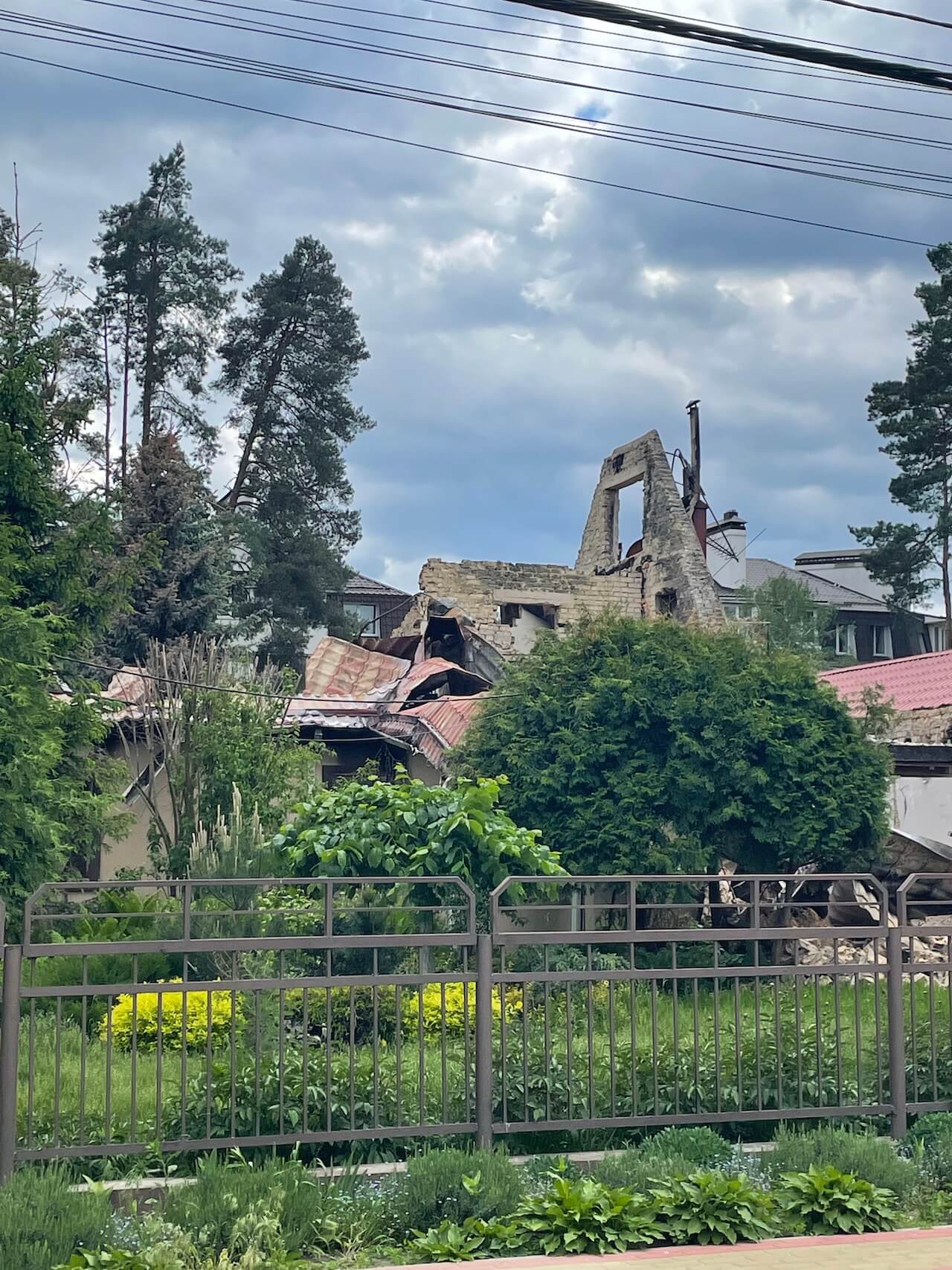
Up to 5,000 civilians remained in Irpin during the occupation. The other 95% of the local population evacuated during first days of invasion, doing so with support of local authorities, defence forces of Ukraine, volunteers and religious (Ukraine Churches) community. Under occupation, the local religious community cared for elderly people who stayed in Irpin town, and supported all inhabitants in need.
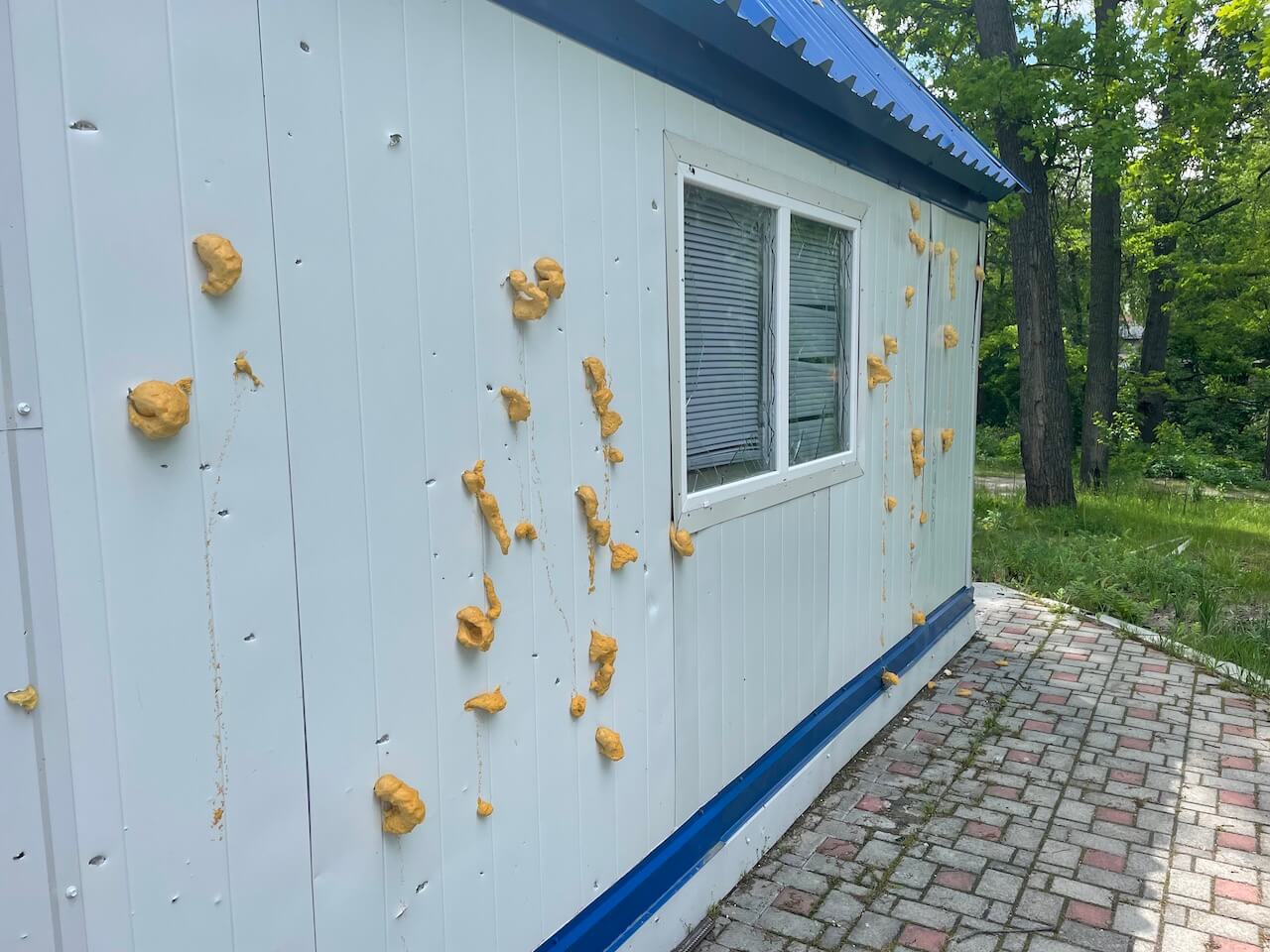
As of early June, 2022, local authorities report that approximately 30,000 local residents currently live in Irpin town, including 1,400 infants. For those children who returned, local educational establishments suggest online schooling; only 1 kindergarten is operational, supporting 20 infants. National Police, Ambulance Service, Gas Service reportedly work in Irpin town already. Public transport (i.e. buses, minibuses) operates regularly, although only 10% of railway connection and infrastructure is restored as of June 13. Critical utility infrastructure in Irpin town was destroyed completely. Gas, water, electricity supply capital restoration started right after the liberation of the settlement. This task is implemented by central and local authorities, in cooperation with special service providers and companies, supported by civil society, business and volunteers. Respondents attached special focus to support the restoration of small and medium enterprises of the town and the area.
People who have a financial capacity can rebuild their homes themselves. Although, many people lost their business or employment and therefore now lack resources to live, as well as lacking resources for rebuilding. There is also a severe situation with homeless animals in the town - those who got lost or left by their “humans”.
The following section is dedicated to a detailed analysis of current challenges and post-occupation needs of Irpin community, based on the perspective of regional and local authorities and agencies, business representatives, civil society, and religious community inputs. Their contributions were obtained through ten comprehensive structured interviews in formal discussions (resulting in more than 6.5 hours of recorded interviews).
CORE CHALLENGES AND NEEDS IDENTIFIED
In terms of post-occupation recovery concerns, the following categories were mentioned as top priority ones (each respondent was prompted to identify multiple priorities). With ten respondents, each point stands for one respondent who prioritised that category of needs. More detailed response rate is shown in Chart #2.
Chart #2: Priority Needs Identified

Categories, not marked as priority needs by any respondent, implying that these issues are already solved to a higher extent: access to information, and legal aid (free primary aid).
With regard to the prioritised categories and groups of categories, respondents reported the following more detailed state of affairs:
HOUSING
As evaluation is still ongoing, 17 multi-storey apartment buildings have already been identified as “to be eliminated totally” since they cannot be restored. Currently in Irpin, encampments and tent camps are available. Starting in early July 2022, train cars converted into family housing will become available too - so called “family compartments”. Irpin town authorities conduct numerous negotiations to support the housing issue in the settlement, but most likely this would not be enough to support all people in need as more and more inhabitants return back. At the same time, church network invited builders to assist the effort, which resulted in 100+ houses restored, with more work underway. In March-May, church network (religious community of Ukraine Church) was purchasing mattresses, blankets, pillows, bed linen, and opened a point of humanitarian clothing distribution. Additionally, 100 volunteering architects joined the reconstruction effort in Irpin.
At the state level, under the programme of the President of Ukraine, money to buy 460 apartments has been allocated. Irpin will obtain approximately 200 of that number. Additionally, new housing camp is under construction in Lastivka - 1,000 apartments, so that by the end of this calendar year people should receive their keys. This implies that approximately 1,200 families will obtain a substitution for their destroyed real estate (households). But as the war has not ended yet, the exact number of prospective repairs or constructions is still unpredictable.
According to respondents, given these developments, further support should be aimed at:
- establishment of temporary housing for inhabitants in urgent need, and / or re-engineering of buildings for other purpose,
- minor restoration in terms of supply of tools, materials and funds for roofs / windows / doors / furniture purchase or repairment,
- development of standard procedure for (a) data collection about damaged and destroyed houses, and (b) planning of restoration and rebuilding efforts, and
- capital restoration of existing buildings (private housing, public infrastructure buildings, critical infrastructure facilities, regional units of state emergency services).
For this category of needs, the following actors reportedly provide aid: Central (national) Government and Local Authorities, Private Business from Ukraine and abroad, United Nations, Promoters and Patrons (personalities), Local Church of Ukraine (religious community), Chaplain Patrol.
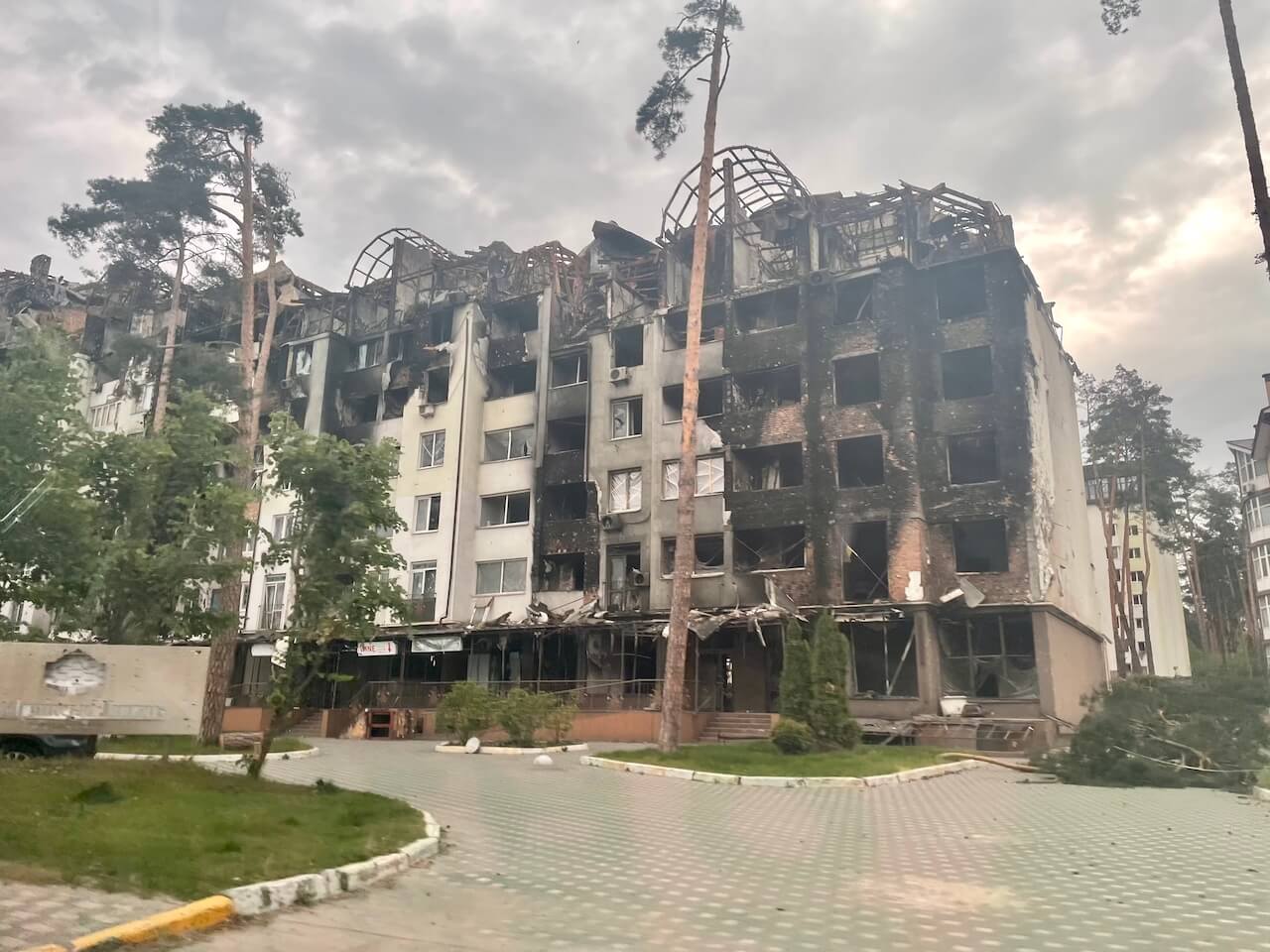
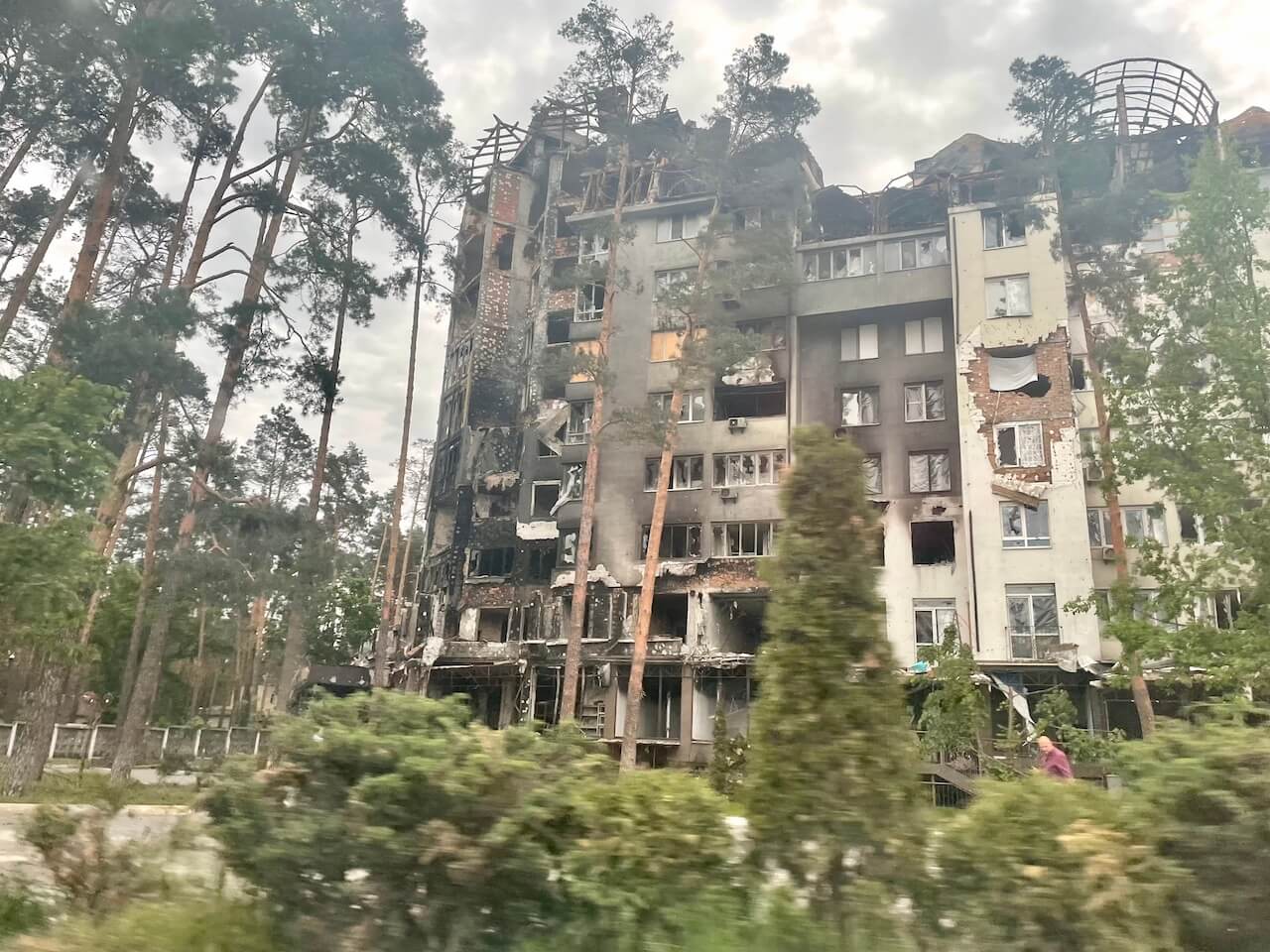
UXO / LANDMINES (HUMANITARIAN DEMINING)
As reported by the State Emergency Service (Kyiv region headquarters), as of 7 June, 98% of public areas in temporarily occupied and now liberated inhabited settlements (i.e. municipal and critical infrastructure, common areas, highways and main roads) have been cleared of explosive remnants; apartment buildings and private houses are upon owner request. Safety of the local population was supported by the call of local mayors for the local population to not come back before general demining actions were completed. Damaged housing is inspected for explosive risks upon owners’ request, as people return. Additionally, there is a need for further humanitarian demining actions for such areas as forests and forest belts, parks and agricultural areas. Full clearance of all areas is likely to require several years, once the war has ended.
According to respondents, given these developments, further support should be aimed at:
- purchase of sapper equipment and personal protection items (ballistic helmets and wests) for servicemen and servicewomen of Emergency Services and Armed Forces,
- purchase of explosive-protected vehicles for demining missions and operations,
- educational materials, information sessions and lessons for local inhabitants concerning the rules of safe behaviour in areas with suspected explosive objects.
For this category of needs, the following actors reportedly provide aid: State Emergency Service (as main responsible agency at the national level), governments of Poland, Austria, United Kingdom, Ukrainian business, and Non-specified International Organisations, Local Authorities.
HEALTH SERVICES
For this category, respondents highlighted that the majority of basic (not specialised) medical needs were ensured by the Government of Ukraine and donors. The Red Cross also provides psychological and medical aid, teaches how to work with stress and how to behave when encountering potentially dangerous (explosive) items.
According to respondents, given these developments, further support should be aimed at:
- supporting emotional resilience and psychological health (of both inhabitants and security sector workers),
- opening pharmacies, medical tests centres, and clinics,
- providing support to health sector employees, in order to make sure that they come back to work in the area,
- capability revival (means of transportation, equipment, esp X-rays), and
- restoration of buildings and other infrastructure of healthcare establishments.
For this category of needs, the following actors reportedly provide aid: Central (Ministry of Healthcare) and Local Authorities, Dobrobut Clinics, UNICEF, ICRC, Saint Ihidii Community (Italy).
FOOD AVAILABILITY / SUPERMARKETS AVAILABLE AND OPEN
Food assistance is still necessary for locals living in temporary houses, socially vulnerable groups and those servicemen and servicewomen who continue their missions on the ground. Even though reportedly nearly all local food shops are open, many people lack sufficient funds to support themselves (amid lost jobs predominantly). Local community envisions that in the autumn food supply will become even more challenging, as the present humanitarian response may be becoming “tired”. Many organisations and networks assist food supply, deliver food packages. Reportedly, more long-term storage products are in demand, as well as food packages and daily public kitchens. Regarding supermarket availability, some have partially reopened and respondents reported a need for help with rubble removal and restoration of buildings, where shops were situated.
For this category of needs, the following actors reportedly provide aid: Local Council Humanitarian Headquarters, Local Authorities, Volunteers and Charitable Foundations, World Food Relief, Samaritan's Purse, Private business and donors from Ukraine, Israel, Georgia, Latvia and other EU countries, UNICEF, and Red Cross.
INCOME SITUATION
Based on respondents' input, all categories of business were hurt heavily by the Russian invasion of Ukraine. In Irpin, facilities of almost all businesses were destroyed - including main employers and biggest tax payers (Tax Academy, Vodokanal, Ecosoft, the Plant). Ecosoft and Academy are gradually repairing their infrastructure, and Vodokanal would require major support. Small and medium entreprises are also slowly coming back to the town. The predominant situation with jobs and income for the local population is still extremely severe.
As a general precondition to fully restore their activity, the business community states the termination (end) of war, support from investors and creditors (credit holidays and other types of preferences). In addition, grant-type aid to restart businesses would be highly appreciated by locals. And, as everywhere in Ukraine, challenges with gasoline and petroleum impact the speed of recovery and negatively influence revival of local business.
DIIA Business Bucha, and the Department of Economic Affairs of Local Council serve as contact points for businesses to share their inquiries. As well, Irpin Investment Council are active in the international arena searching for opportunities to relieve the needs of the local community. Still, very limited aid was reported as currently available for this category of needs. At the same time, thematic foundations and support programs continue to emerge both in Ukraine and worldwide.
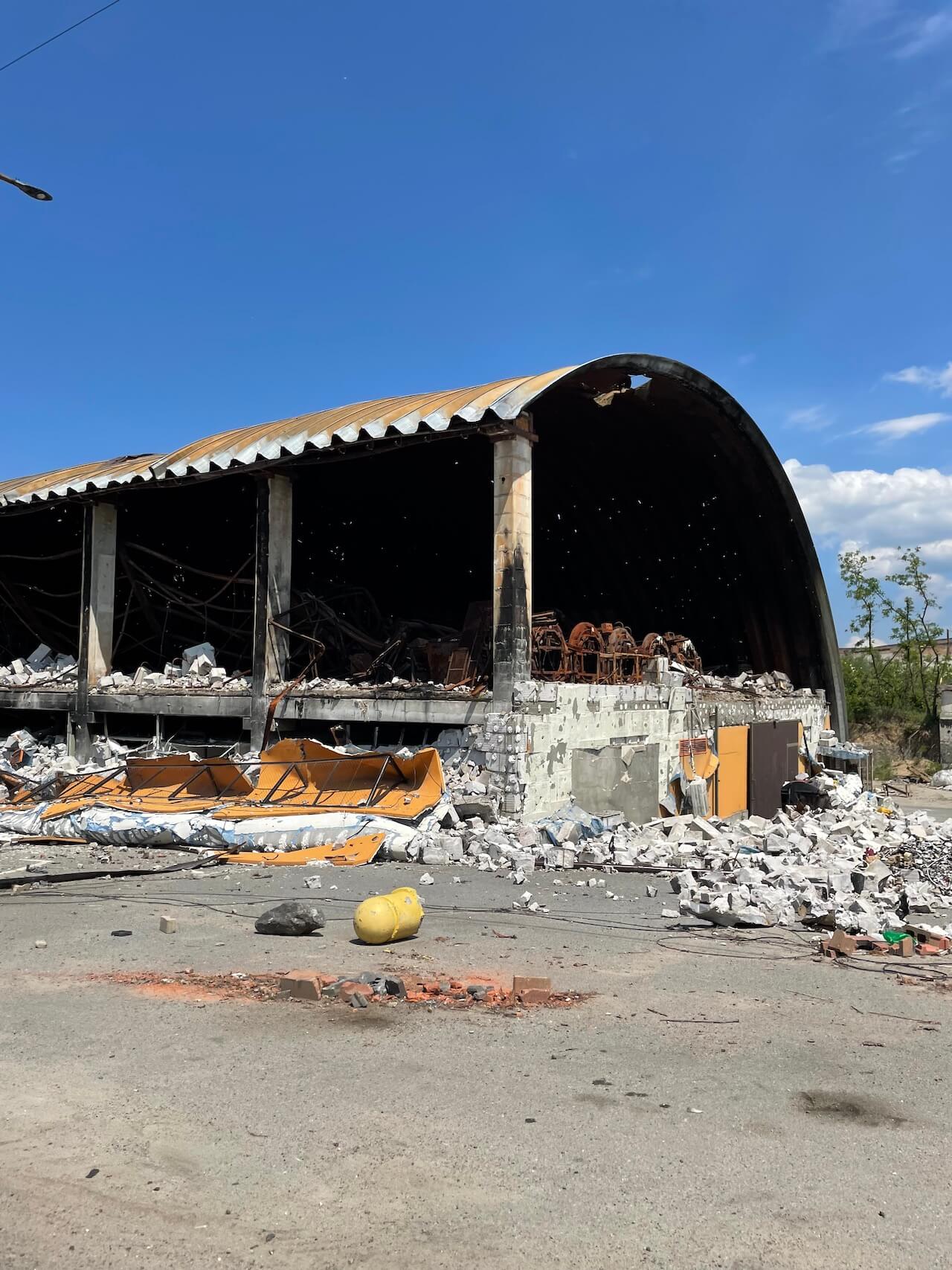
EDUCATION SERVICES
Almost 100% of educational infrastructure is affected by missile strikes, shelling or fires; educational establishments were heavily looted. 80% of schools and kindergartens require capital repair, materials and equipment for reconditioning. Currently, the Irpin town Mayor works actively on the international level, developing opportunities for cooperation to restore these buildings. This prospective support would cover approximately half of required funds, hence, the need to enhance support for this category is important. UNICEF and other actors who support emergency HOUSING are also actively helping to assist with EDUCATION.
RUBBLE REMOVAL / GARBAGE COLLECTION
While major rubble (especially, on roads) are now being cleared by national and local agencies, the necessity still exists to support private companies and households in this regard (by purchasing equipment, vehicles, petroleum, and inviting more specialists to conduct the work). At the system level, specialised municipal vehicles were stated as core necessities for further effective operations, as 60+ specialised vehicles were completely burnt out during occupation. As local authorities collect and regularly update the list of needs under this category, they announced readiness to provide specified information upon request.
For this category of needs, the following actors reportedly provide aid: State Emergency Service, Kyiv City and Region Entities, Neighbouring Communities, Local Authorities.
Photo #4: Irpin - Unidentified Local Business
WIFI / INTERNET SERVICES / MOBILE PHONE SERVICES
This aspect is restored throughout almost the entire territory of Irpin settlement, although core infrastructure within private households was not repaired everywhere. In addition, some respondents identified the need for a more secure and stable internet connection.
STATE-PROVIDED ADMINISTRATIVE SERVICES
For this category of needs, a wide range of services were considered, including state registration procedures and social services. Reported needs include building further capacity of social services, as the number of their staff is insufficient to the emerging quantity of people and families in Bucha rayon, who are entitled to obtain social support under Ukrainian Law. Another aspect is the challenging procedure to obtain state-provided financial aid. Even though many services are available online, many people applied for financial assistance months ago, and still do not know what they might do to either claim further implementation of such state service, or obtain information about their “place” in the queue of those who anticipate financial aid, despite the announcement by the Prime-Minister of Ukraine in April that work was underway to solve the issue.
WATER / ELECTRICITY
Major aid to restoring water supply (along with drainage and sewerage) local systems was provided by the International Committee of the Red Cross and other international donors in the first days right after the liberation of Bucha rayon. A joint project on water supply restoration engaged Irpin, Bucha, Hostomel and Borodyanka, lasting 18 days. As of April 28, water supply had been ensured to Irpin community, from where water pipeline restoration spread to other settlements.
According to respondents, given these developments, further support should be aimed at:
- further evaluation and capital repair of water supply, drainage, sewerage, electricity, and heating systems of the settlements (as more people come back to their households and pressure on the systems increases, new issues may arise due to technical inability to identify such problems under earlier circumstances),
- funding of capital restoration of water treatment (aeration) systems in the region aiming at better ecological conditions and resiliency.
For this category of needs, the following actors reportedly provide aid: UNICEF, ICRC, ACTED, Volunteers and Business, Local Authorities.
CONCLUSIONS & KEY OBSERVATIONS
In the case of Irpin town and community, several problems were identified with different frequency than in other towns covered in this Rapid Needs Assessment. This suggests the need for assistance which is both comprehensive and able to respond to differences in local situations. The bigger a settlement under post-occupation revival, the greater the need for coordination among donors and volunteer networks coordination.
One of main challenges is the absence of free access to gasoline and petroleum throughout the entire territory of Ukraine, which consequently reduces speed of envisioned activities, logistics and repairs, and raises costs of any potential aid. Not all respondents mentioned this aspect as it became general knowledge in Ukraine, and was usually implied by default.
Even though the entire list of necessities is wide and multi-layered, four central high priority issues are vital for post-occupation recovery in the region - housing, UXO / landmines, health services, and food availability (the latter is closely linked with the employment issue).
According to the key informants interviewed, at the very beginning of the deoccupation period international organisations (UN and INGO) provided assistance directly to local communities. Since then, nearly all assistance goes through national emergency response organisations, churches and the Humanitarian Hubs established by local councils, and from there to those in need of assistance.
Local networks and authorities have proven to be best situated and equipped to collect, operate and spread the word about the urgent needs of their communities. However, availability of knowledge and information about global opportunities, assistance programs and initiatives are often lost on the way to final recipients and beneficiaries, who are not always aware of the sources of the support they receive.
Rather than importing supplies to respond to local needs, in most cases it is possible (and desirable) to solve problems with locally available supplies. Majority of products, goods and services required for effective and efficient post-occupation recovery are available on Ukrainian markets in other regions and cities. Purchasing locally in Ukraine would also support the business environment and national economy.
While the war is still on, any type of post-occupation restoration is rather complicated to orchestrate and conduct. Nonetheless, local inhabitants express a strong desire to return to normal life as soon as possible, a readiness to restore their houses, and to return to any available jobs. Continuing assistance for the needs identified in this report will provide an important contribution to immediate and medium term recovery. Respondents expressed their willingness to be contacted regarding potential support; contact information may be requested from RMTeam International ([email protected]).